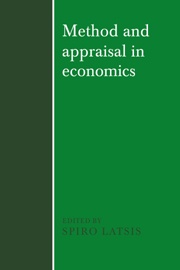Book contents
- Frontmatter
- Contents
- Preface
- A research programme in economics
- Economics and psychology: the death and resurrection of a research programme
- Schools, ‘revolutions’ and research programmes in economic theory
- Anomaly and the development of economics: the case of the Leontief paradox
- From substantive to procedural rationality
- Kuhn versus Lakatos or Paradigms versus research programmes in the history of economics
- On the history and philosophy of science and economics
- ‘Revolutions’ in economics
- Index
On the history and philosophy of science and economics
Published online by Cambridge University Press: 23 November 2009
- Frontmatter
- Contents
- Preface
- A research programme in economics
- Economics and psychology: the death and resurrection of a research programme
- Schools, ‘revolutions’ and research programmes in economic theory
- Anomaly and the development of economics: the case of the Leontief paradox
- From substantive to procedural rationality
- Kuhn versus Lakatos or Paradigms versus research programmes in the history of economics
- On the history and philosophy of science and economics
- ‘Revolutions’ in economics
- Index
Summary
Methodological questions in economics have often been discussed in terms that are too abstract and too exclusively normative. Slim volumes or essays about the ‘scope and method’ or the ‘nature and significance’ of the subject, seem often to have been concerned mainly with ideal epistemological models which are almost as remote from the actuality of what economists do, as economic models of smoothly and ideally selfequilibrating processes are remote from the processes of the real economic world. Intellectual norms are prescribed, and, it seems to be implied, are actually upheld, which are certainly not in fact followed, and perhaps could not practicably be followed, by economists. Moreover, generalisations, normative or positive, are inevitably highly abstract, or stylised, when they relate to ‘science’ and ‘scientific method’ in general, or to ‘the social sciences’ generally, or even to economics as a whole, which comprises theories and arguments of very varying epistemological types and calibres.
It could, therefore, constitute a most welcome and significant example, as far as economics is concerned, that in their different ways, in the work of both Kuhn and Lakatos, the history of science, and its analysis or philosophy, have been brought together for mutual illumination. Certainly there is the danger here of normative–positive confusion, insofar as the philosopher of science may be seeking to prescribe what scientists ought to have done or decided (or be doing or deciding) while the historian is attempting rather to set out what they actually did do or decide.
- Type
- Chapter
- Information
- Method and Appraisal in Economics , pp. 181 - 206Publisher: Cambridge University PressPrint publication year: 1976
- 11
- Cited by



